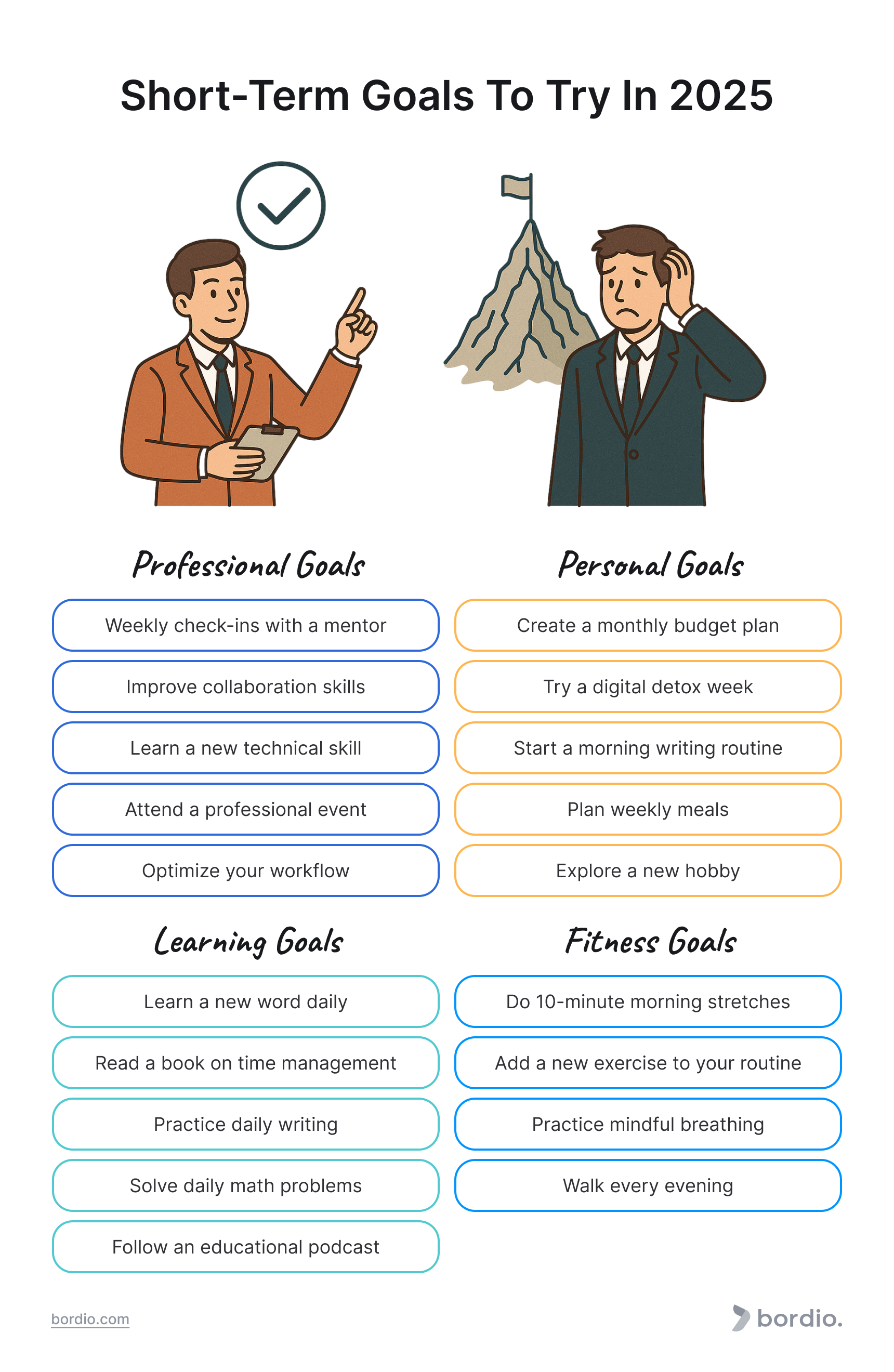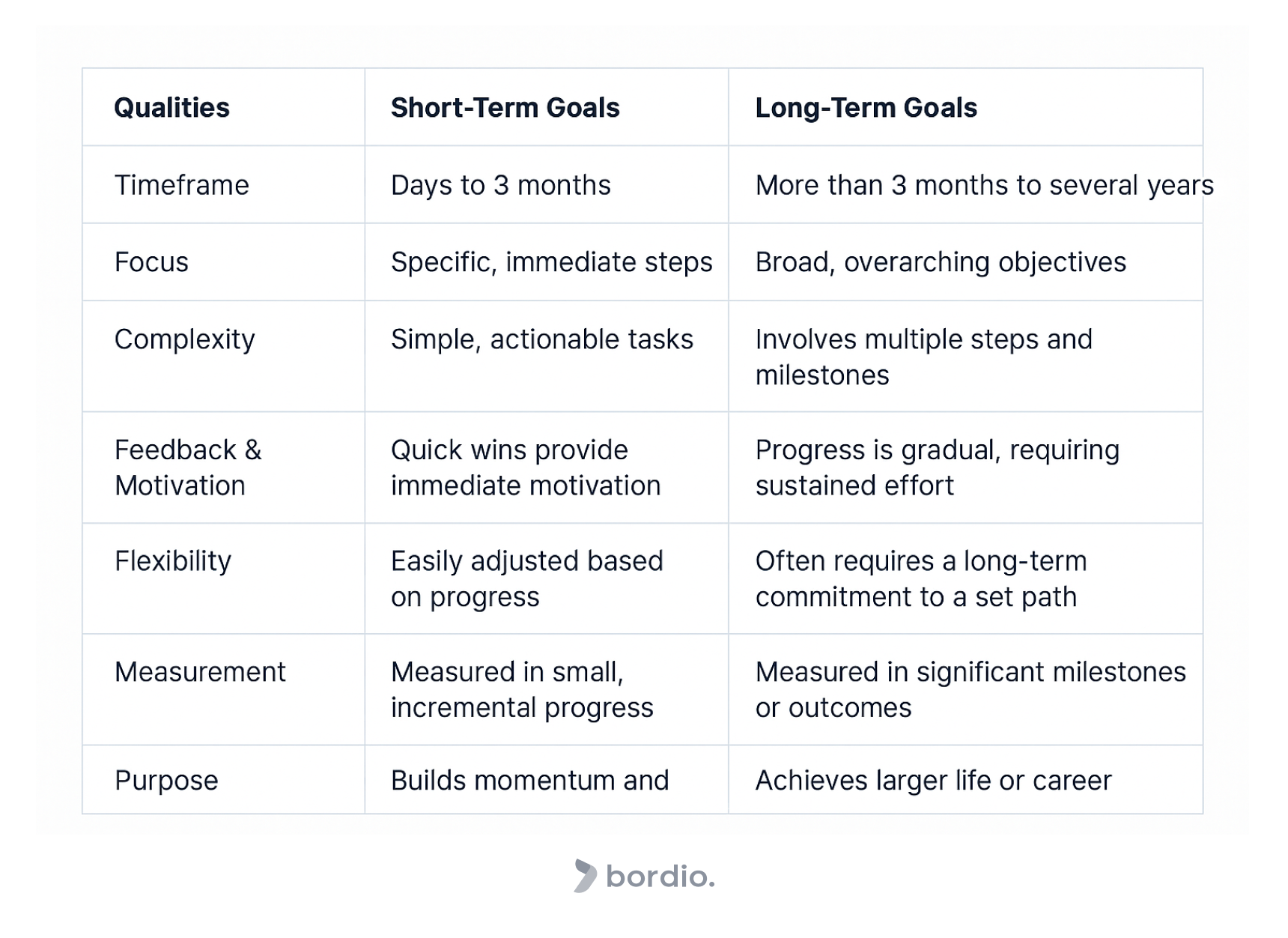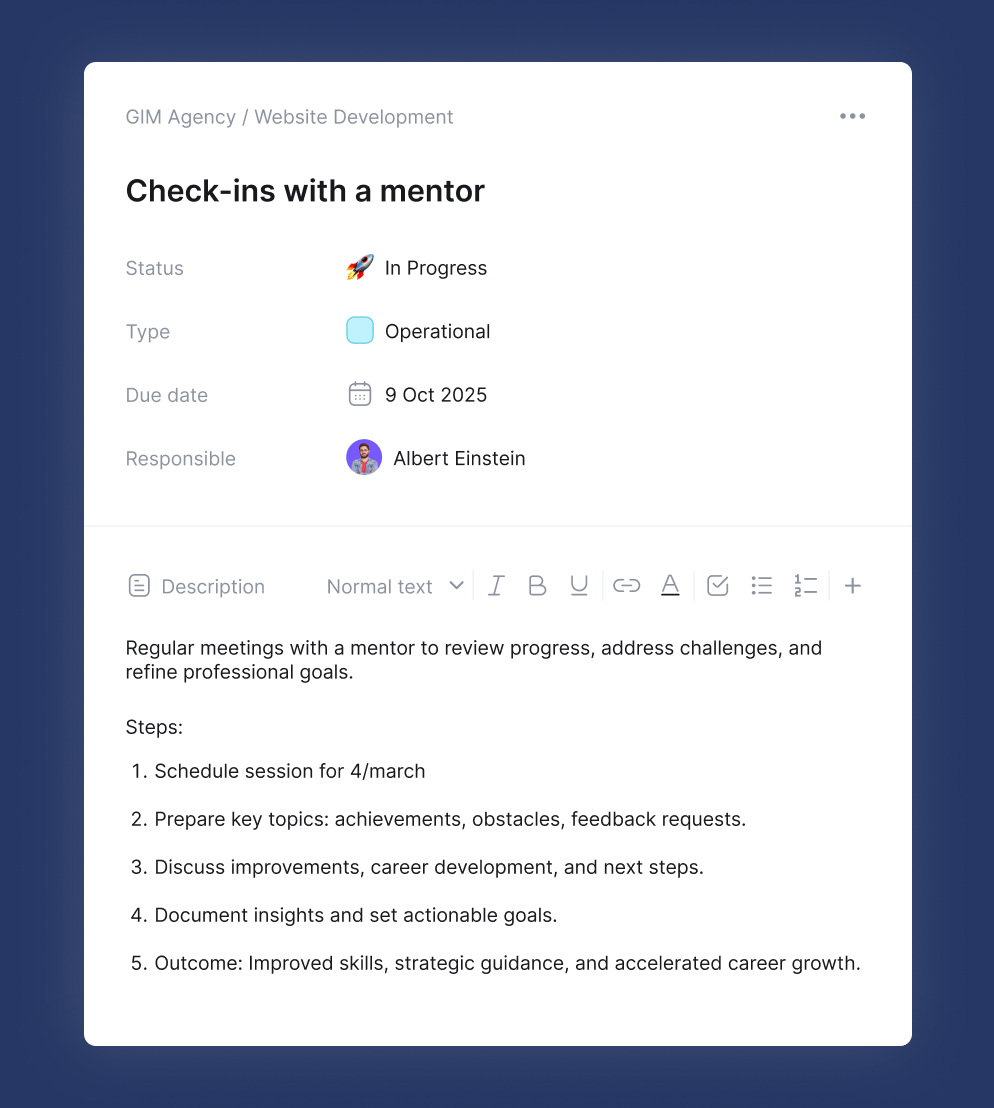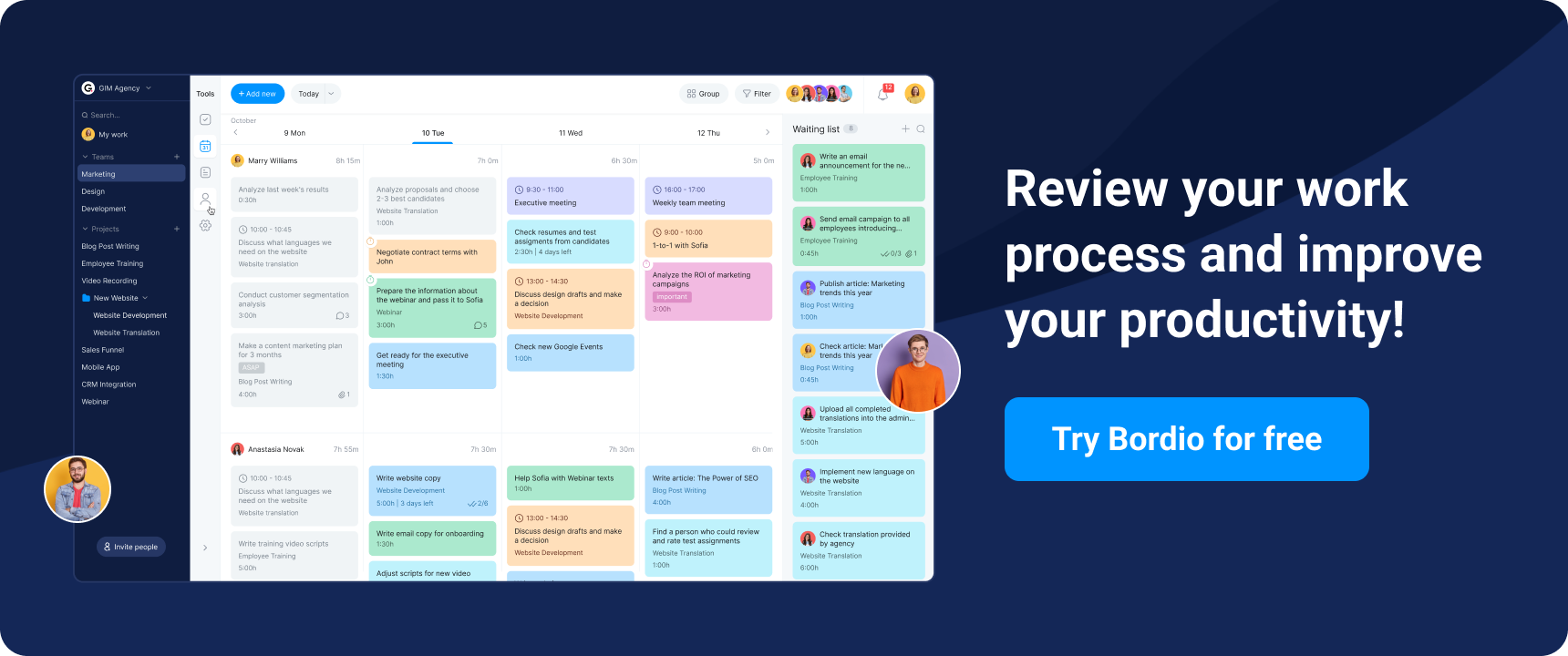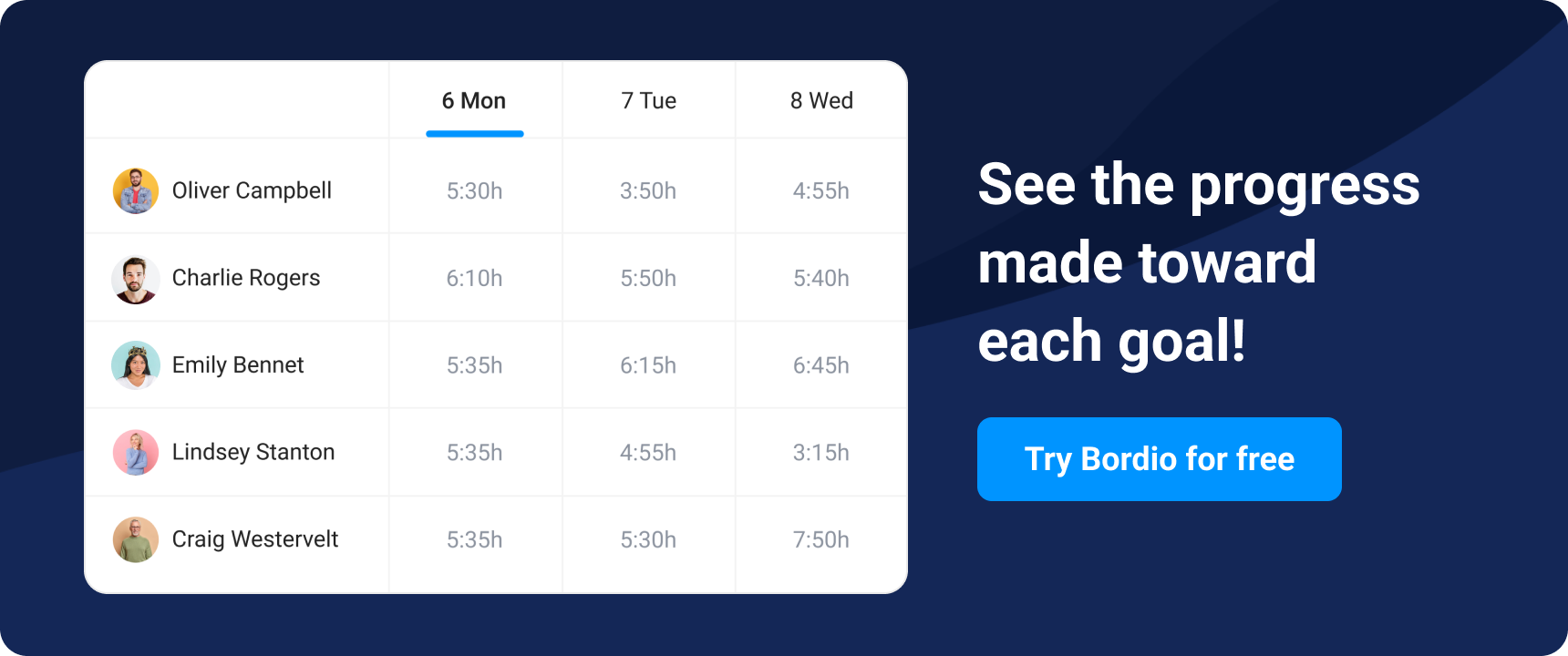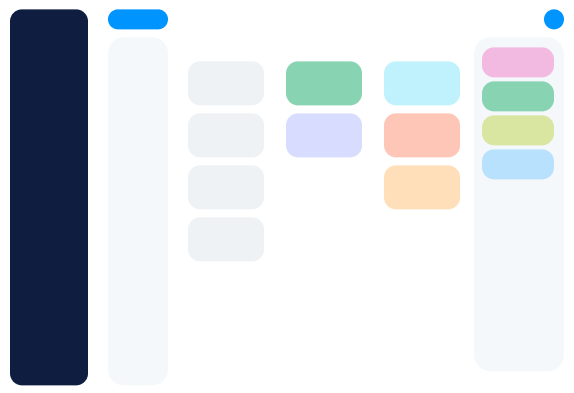Imagine you have a big goal, like learning a new language or advancing your career. Although thrilling, it may also be overwhelming. Long-term objectives can be challenging to maintain, particularly if you wait to see the desired outcome. Setting short-term goals may help you make progress by enabling you to take consistent, manageable actions. Seeing results in the near future inspires you to keep going after these little victories.
What are short-term goals?
Short-term goals are the quick wins you can achieve within days, weeks, or up to three months. They serve as stepping stones toward bigger dreams. For example, instead of setting a long-term goal like “speak French fluently,” you could start with a smaller one, like “learn five new French words daily.” These manageable goals make it easier to track progress and enjoy the journey.
Short-term goals are mainly used to establish momentum and a feeling of direction. Completing these minor activities can give people confidence and drive and make it simpler to take on larger, longer-term goals. Short-term objectives make regular monitoring and evaluation possible.
Short-Term Goals vs. Long-Term Goals
Short-term goals are designed to be achieved within a timeframe of days to three months. They focus on specific, immediate steps that lead to quick wins, making tracking progress and maintaining motivation easier. These goals typically involve simple, actionable tasks that can be easily adjusted based on ongoing progress. Success is measured based on small, incremental achievements, which help build momentum and confidence as individuals work toward larger aspirations.
Tip: Explore more on how to improve team performance!
While short-term goals focus on achievable targets within a short timeframe, between a week and up to three months, long-term goals stretch beyond three months and aim at more significant, more comprehensive results. The difference between them often lies in their complexity and duration. They focus on broad aspirations, providing direction and purpose over an extended period. Unlike short-term goals that emphasize immediate steps, long-term goals outline the ultimate outcomes one wishes to achieve, such as attaining a certain level of education or reaching a professional milestone. These goals are inherently more complex, requiring multiple steps and resources, necessitating careful planning and perseverance.
Types of short-term goals to try this year
What short-term goals should you try to improve your life in 2026? Here are a few areas we recommend you take a closer look at:
Professional short-term goals
Short-term professional goals center on developing abilities and accomplishing tasks that can support career advancement. In simple words, you take small steps to improve your professional life. Here are some ideas for short-term goals in the professional field:
Schedule weekly check-ins with a mentor
Meeting with a mentor regularly helps you get structured feedback and guidance. Set up short weekly sessions to talk through challenges and get practical advice. Set specific goals for each meeting. These could involve advancing one’s job, honing particular skills, or learning how to deal with particular difficulties. Each meeting might be used to discuss particular challenges or choices you face.
Improving your collaboration skills
Completing an online course that is pertinent to your industry might enhance your qualifications and expertise. For example, a training program building good teamwork skills helps in any job. Look for miniature online courses covering conflict resolution, task sharing, stress management, or communication. Aim to finish one of them in a week by studying every day. Bordio’s team management software. can assist you in creating a plan for your course by reminding you of deadlines and tracking progress and each stage of skill development. Next week, after this half marathon, you will finish one and see the desired outcomes!
Learn a new technical skill
Learning new skills can boost productivity and make you more competitive. Pick one new skill, like basic programming or design software, and work on it for one hour daily. Try a mini-project after a month to apply what you’ve learned.
Attend a professional event
Find a conference, workshop, or webinar related to your field and make participating a goal. Prepare questions for the speakers and plan how to meet people to build helpful connections for your career. You can even become a speaker and try to attend a public speaking event on a topic related to your profession. Get out of your comfort zone!
Review your work process
Look closely at your work to see what’s effective and what could be improved. This might include tracking your productivity on each task, cutting out distractions, or finding better ways to handle your workload. Set a goal to find at least three improvements and apply them in half of the next month. With our employee productivity tracker, you can plan and analyze your daily tasks, improving your productivity and identifying what makes you more effective.
Personal short-term goals
Personal goals frequently focus on well-being and self-improvement. For example, developing a morning routine can improve output and create a productive atmosphere throughout the day. Greater financial stability can result from developing sound financial habits, such as creating a budget or setting aside a certain monthly amount. And finally, improving relationships – whether by planning frequent get-togethers with friends or engaging in active listening with family – can fortify ties and expand your support network.
Create a monthly budget plan
If you have any credit card debt or whether you want to save some money for a big purchase, you should create a budget plan. Analyses your monthly income and see where you can cut back on spending. Set a budget for things like entertainment or eating out. Try sticking to the plan for a week and track how well you follow it.
Try a digital detox week
Pick a week to cut down on social media and entertainment apps. Aim to spend at most 30 minutes a day on your phone. Make a list of other things to do so you can stay busy.
Start a writing morning routine week
Morning pages are a fantastic routine for improving mental well-being. Experts recommend starting your day by grabbing a notebook first thing after waking up, even before reaching for your phone, and spending five uninterrupted minutes writing down whatever comes to mind. This could include recording a dream, listing your plans for the day, or unloading any worries from daily life. Having this practice daily for a week helps clear your mind by leaving your concerns on paper so you feel more energized, but it can also bring valuable insights from your subconscious when you review your entries. Add this morning routine to your daily plans in Bordio!
Plan your meals for a week
It might be draining to think about what to make each day, and ordering takeout is less rewarding than cooking for yourself. However, after a demanding workday, finding the drive to organize and shop might be challenging. Meal planning might help you eat a more diversified and healthful diet. Create a menu, write a shopping list, and stick to it. Try doing this for three weeks, and you will see how your diet improves.
Explore a new hobby
Small hobbies can also make great short-term goals. For example, you could learn to draw frogs, complete a diamond painting, create a mini tapestry using tufting techniques, or explore a unique cultural phenomenon. Pick an art or cultural interest (like photography, painting, or literature) and dive into it for a week. Watch videos, read articles, or attend events to learn the basics.
Tip: You might be interested in “Examples of Good Habits To Get You Inspired!”
Learning short-term goals
Short-term learning objectives promote skill development and personal development; let’s take a look at some of them:
Learn one new word a day
Growing your vocabulary in English or any language is a great habit. Add one new word to your list each day. Over time, these small steps make a big difference.
Read a book or take a course on time management
Good time management skills help in every area of life. Choose a book or course with practical, time-saving tips. Try to implement at least two new methods within a month.
Do saily writing exercises
Writing exercises aren’t just for writers; they’re helpful for anyone who needs to write well. Spend 15 minutes a day practicing, whether journaling, drafting essays, or writing social media posts. You can add writing exercises in the Bordio task planner as daily tasks, tracking your progress and marking completion.
Practice 10-minute daily math problems
Short, daily math exercises keep your brain sharp. Ten minutes daily can help you stay confident with numbers, which is handy in many daily situations.
Subscribe to an educational podcast or YouTube channel
Find a podcast or YouTube channel that covers a hobby or career-related topic. Aim to listen to or watch one episode once per week and take notes to remember the key points.
Fitness short-term goals
Prioritizing exercise and health is crucial for general well-being. Establishing objectives like working out frequently might entail committing to a specific number of weekly sessions or attempting a novel physical activity like yoga or cycling. Another attainable aim is increasing water intake, which may be monitored daily to guarantee enough hydration. Other ideas of fitness short-term goals:
Do 10-minute morning stretches
Morning stretching helps wake up your muscles and improve flexibility. You can stick to a 10-minute routine every morning for a month and see how you feel.
Add a new exercise to your routine
If you already work out, add something new, like interval running, swimming, or weight training. Aim to work this new exercise into your routine over a month. Planning workouts in the Bordio task tracker will help you integrate new exercises into your routine without missing a beat.
Practice mindful breathing daily
Deep breathing helps with stress and focus. Spend 5 minutes daily on mindful breathing exercises, focusing on each breath. Try doing it daily for a month.
Go for a walk every evening
Walks are great for clearing the mind and are one of the simplest forms of exercise. Setting a short-term goal to go for a walk after dinner each day for a week can be really refreshing. Try going without headphones and avoiding your phone while walking, and plan different routes each time to keep things interesting. This not only adds variety but also introduces a few hours of digital detox into your daily routine.
Why are short-term goals so helpful?
If you try adding a few short-term goals in a few different ways that suit you into your routine, you’ll be surprised by how effective they can be, no matter how simple they seem. Why is that?
Stay focused
Short-term goals help you maintain your attention on what matters most in the present. By breaking larger objectives into manageable tasks, you can concentrate on specific actions that drive immediate progress. This focused approach minimizes distractions, enabling you to allocate your time and energy effectively and ensure that you are making meaningful strides toward your overall aspirations.
Build motivation
Reaching short-term objectives gives you a sense of accomplishment, increases your self-esteem, and motivates you to keep going. Every little victory strengthens your resolve and adds to the journey’s sense of fulfillment. As you check off tasks, you gain momentum, inspiring you to tackle more significant challenges and maintain a positive mindset throughout your endeavors.
Tip: You might be interested in “37 Practica Team Management Tips”
Adapt and adjust
Short-term goals offer the flexibility to make necessary changes and fine-tune your approach without facing significant setbacks. You can easily adjust your plans if you encounter obstacles or realize that a particular strategy isn’t working. This adaptability enhances your learning experience and encourages resilience as you learn to navigate challenges while progressing toward your long-term objectives.
Steps to setting short-term goals that work
1. Decide on priorities: What matters most to you right now? Use the Bordio work productivity tracker to set priorities visually, making it clear which tasks matter most right now.
2. Set clear goals: Make them specific, measurable goals, and attainable.
3. Track your progress: Use project management tools or apps to monitor your steps – Bordio will help you see your progress for each goal, making it easy to add tasks and milestones.
4. Review regularly: Check in on your goals to see how it’s going and make changes if needed. Bordio project task list for team goals. It reminds each team member with you of important check-ins and helps you adjust plans flexibly as needed.
5. Build self-discipline: Keep yourself accountable. Sometimes, you’ll need to push through, even if motivation dips.
6. Avoid common pitfalls: Don’t set unrealistic goals—it can lead to burnout.
7. Celebrate wins: Even small wins matter. They give you a sense of progress.
8. Use habit-tracking apps: Apps can help you stick to your routine, track spending, and keep goals top of mind.
Tip: We also recommend – “How long does it take to build a new habit.”
Final thoughts on short-term goals
Short-term goals aren’t just tasks and building blocks to more significant achievements. They help you stay motivated, gain confidence, and work toward your dreams one step at a time. Pick a short-term goal today, use the SMART approach to outline it, and watch those small wins add up. Remember, each step you take brings you closer to setting your desired life.
